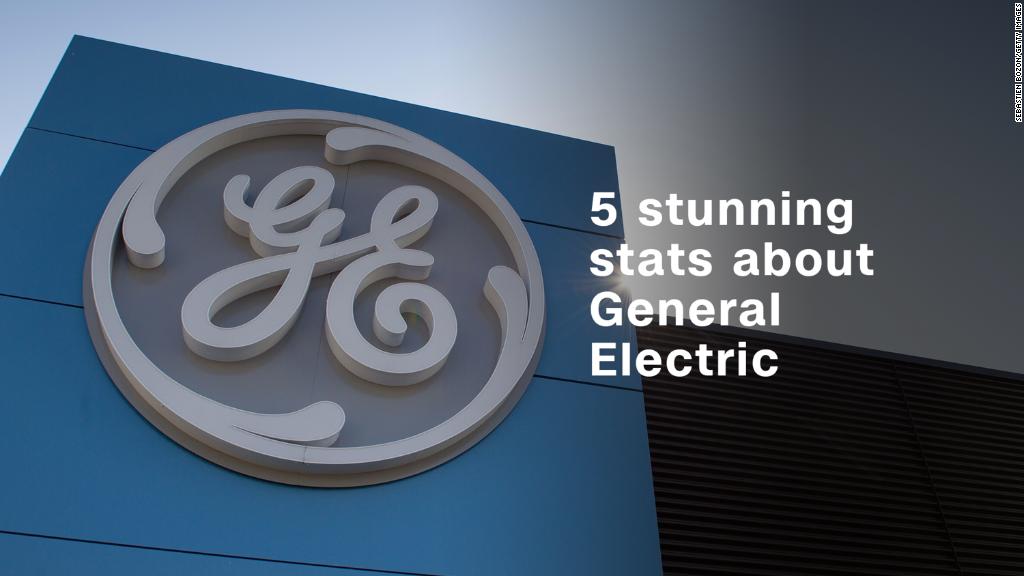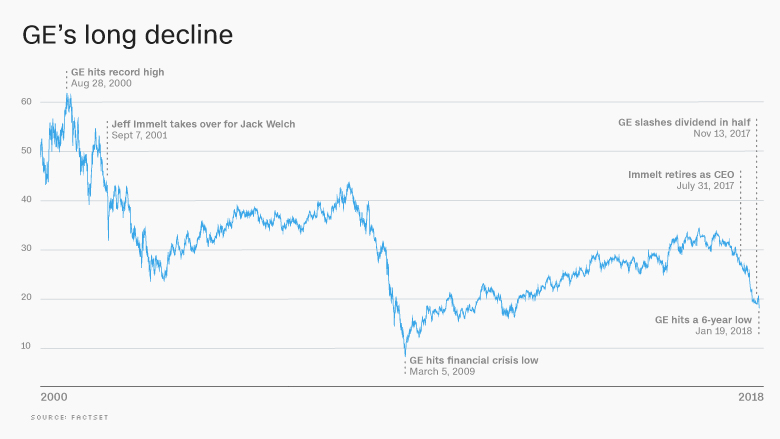
1. GE's downfall: Almost everything is going up on Wall Street these days. But not General Electric.
It's stunning to see GE (GE), one of America's most storied companies, left far behind the roaring stock market.
While the Dow was cruising past 26,000 last week, GE was suffering through its worst week since the Great Recession. A cash crunch has driven the iconic maker of light bulbs, jet engines and MRI machines to a six-year low.
As if missing the stock market boom weren't insulting enough, GE's downfall hasn't even rattled markets that used to live and die with its every move.
Years ago, if GE's earnings were off by even one penny per share, it would spook Wall Street, according to Steve Ruffley, chief market strategist at InterTrader.com.
"Now they are tanking and markets just make record highs," Ruffley said on Twitter.
The rest of corporate America is minting money thanks to the stronger economy and huge tax cuts. Bullish investor sentiment climbed last week to the highest level since April 1986, according to Investors Intelligence.
While the Dow has spiked 42% since President Trump's election, GE has lost a stunning 45% of its value. Unfortunately for GE, that's not a new trend. The conglomerate was the worst Dow stock during the 16-year tenure of former CEO Jeff Immelt.
Fran Winiker, a former 20-year GE employee, said she "watches with envy as the stock market climbs to new records" yet her GE shares are "tanking."
"I have lost faith in this once iconic company," said Winiker, who worked at NBC when it was owned by GE.
GE faces a monumental task when it reports results on Wednesday. Can CEO John Flannery calm investors who fear that another shoe will drop? GE's larger-than-feared $6.2 billion insurance charge last week renewed concerns about other problems hidden on its balance sheet.
"Nobody trusts the numbers. People think something is buried there. That's why GE is a falling knife right now," said Alicia Levine, head of global investment strategy at BNY Mellon.
Related: GE's $31 billion pension nightmare
Flannery signaled this week that he's seriously considering taking the once-unthinkable step of breaking up the company.
But analysts warn that such a move could be messy, especially considering the $31 billion pension shortfall GE faces.
Rather than dismantling itself, some analysts think GE needs to fortify its balance sheet by selling more stock to the public. GE told CNNMoney it has "absolutely no plans" to do that.
Companies hate taking that step because it hurts existing shareholders by watering down their holdings, at least in the short term.
Still, GE's "cash squeeze" is so bad that it could make a share sale "unavoidable," Deutsche Bank analyst John Inch wrote in a report on Friday.
The last time GE had to do that? The 2008 financial crisis.

2. Trump goes to Davos: The World Economic Forum, where CEOs, entrepreneurs and world leaders rub elbows in the Swiss Alps, starts on Tuesday. President Trump will deliver an address on Friday.
Trump's presence at a meeting of the world elite may seem surprising in light of his anti-globalization rhetoric. And he may face a tough crowd. But there are a few things Trump could say to calm executives' nerves at Davos.
He could promise to tone down his aggressive stance toward North Korea, reconsider his decision to exit the Paris climate deal or vow not to start a trade war with China, Mexico or Canada.
British Prime Minister Theresa May and European Commission President Jean-Claude Juncker, who are at opposite ends of the contentious Brexit talks, each speak on Thursday. Things could get heated.
Related: What Davos wants to hear from Trump
3. Big week for earnings: Netflix (NFLX) reports on Monday. Procter & Gamble (PG), Verizon (VZ), United (UAL) and Johnson & Johnson (JNJ) talk about their results on Tuesday. Comcast (CMCSA) and Ford (F) go Wednesday, as does GE. American Airlines (AAL), JetBlue (JBLU), Southwest (LUV), Caterpillar (CAT), Intel (INTC) and Starbucks (SBUX) all report earnings on Thursday. And Honeywell (HON) is set to close out the week on Friday.
4. NAFTA talks resume: Representatives from the United States, Canada and Mexico get together in Montreal on Tuesday for the sixth round of talks on rewriting the three-nation trade deal.
So far, they haven't made much progress. The top issue is how and where cars are manufactured in North America.
After the previous round of talks, in November, U.S. Trade Representative Robert Lighthizer said he was "concerned about the lack of headway." Canadian Foreign Minister Chrystia Freeland said the United States had put forward "extreme proposals" that "we simply cannot agree to."
Seven rounds of talks are planned in all.
Trump blames NAFTA for the loss of hundreds of thousands of American jobs, but the U.S. Chamber of Commerce says 14 million American jobs depend on trade with Canada and Mexico, which has boomed since NAFTA became law in 1994.
As the talks resume, President Trump will have to decide on another global trade matter: Whether to impose tariffs on foreign imports of solar panels, most of which come from China. The deadline is Friday.
Related: NAFTA talks are in trouble
5. Q4 GDP: The Commerce Department on Friday gives its first estimate for economic growth from October through December.
The American economy grew at an annual rate of about 3% in the previous two quarters. The last time that happened -- back-to-back growth of 3% -- was in 2014. Three in a row would be a triumphant end to Trump's first year in office.
Related: Economy posts impressive growth despite hurricanes
6. Coming this week:
Monday -- Netflix earnings.
Tuesday -- Procter & Gamble, Verizon, United, Johnson & Johnson earnings; Davos starts; NAFTA talks start.
Wednesday -- Comcast, Ford, GE earnings.
Thursday -- American Airlines, JetBlue, Southwest, Caterpillar, Intel, Starbucks earnings.
Friday -- Honeywell earnings, Q4 GDP.


